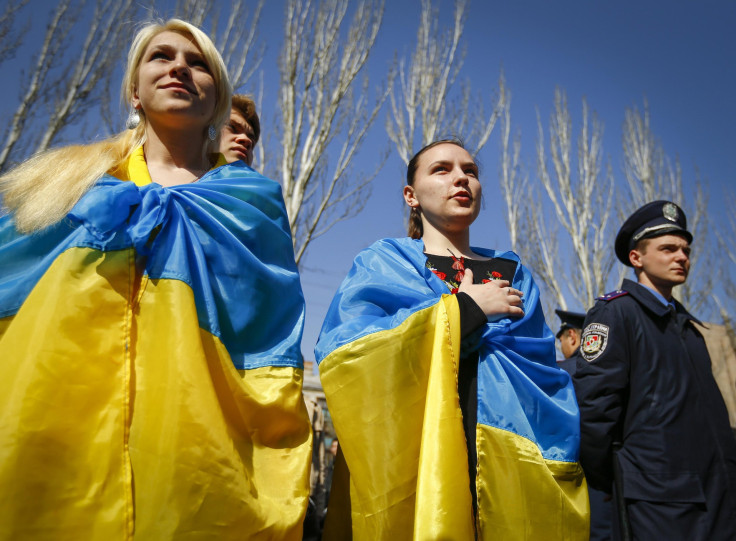Ukraine On ‘Brink Of Civil War’ As Diplomats Reach Initial Agreement

In a press conference on Thursday in Geneva, U.S. Secretary of State John Kerry said that an agreement has been reached among Russia, Ukraine, the U.S. and the European Union. The pact will involve an “inclusive, transparent and accountable constitutional reform process” in Ukraine and the withdrawal of pro-Russian militants in the eastern part of the country.
“This is just the beginning, and it depends on the faith of good parties following through,” Kerry said. “We’re going to watch that very closely.”
Amnesty will be granted to pro-Russian protesters who participated in the uprisings, except for those found guilty of capital crimes. Armed groups must be disarmed and seized government buildings, streets, squares and public places returned, the agreement said.
“The Geneva meeting on the situation in Ukraine agreed on initial concrete steps to de-escalate tensions and restore security for all citizens,” the leaders said in a joint statement. “All sides must refrain from any violence, intimidation or provocative actions. The participants strongly condemned and rejected all expressions of extremism, racism and religious intolerance, including anti-semitism.”
The agreement in Geneva came a day after one of the deadliest clashes in eastern Ukraine, where Ukrainian government security forces clashed with pro-Russian activists in the eastern city of Mariupol overnight, killing three and wounding 13.
The fire fight was the most deadly so far in what has become a 10-day pro-Russian uprising in eastern Ukraine. Similar clashes in other eastern cities in Ukraine have begged the question of whether the country is on the “brink of a civil war” -- a sentence Russian President Vladimir Putin used himself to describe the situation.
During Thursday’s attack in Mariupol, protesters allegedly stormed a Ukrainian National Guard base overnight. A “short battle” ensued where Ukrainian commandos and counterintelligence units managed to regain control of the area.
“A mob of 300 militants, wielding guns, molotov cocktails and homemade explosives, attacked the Ukrainian military outpost in the city overnight,” Interior Minister Arsen Avakov said in a statement.
The unrest has raised speculation over whether Russian special forces were operating in eastern Ukraine, an allegation that Putin dismissed as “rubbish.”
On Thursday, Putin participated in a live televised question and answer session where he referred to Russia’s imperial history, using the name that some territories in eastern Ukraine were given by Catherine the Great's close advisor, Grigory Potemkin, calling them "Novorossiya," or "New Russia."
That 18th-century reference bears a close resemblance to a map found in the Kyiv Communist Party headquarters last week that showed Ukraine divided into four provinces. The southern one was labeled "Novorossiya."
@andrewsweiss As usual, it's a term with a history. @wjantholis @NOVORUSSIA2014 pic.twitter.com/8EwRH1HVxG
— James Cameron (@CameronJJJ) April 5, 2014On Wednesday, before the Geneva agreement, President Barack Obama told CBS News that Russia’s actions could result in more sanctions.
"What I've said consistently is that each time Russia takes these kinds of steps that are designed to destabilize Ukraine and violate their sovereignty, that there are going to be consequences," Obama told CBS. "And what you've already seen is the Russian economy weaker, [and] capital fleeing out of Russia."
The latest string of violence is part of a deepening crisis in Ukraine, where pro-Russian protesters are pushing either to turn the country into a federation, with the Russian-speaking eastern part more loosely tied to the Ukrainian-speaking western part of the country than it is currently, or to have the eastern parts join Russia. Civil unrest began last month when Russia successfully annexed Crimea, a move that sparked international outrage.
Now, the violence has spread to the Donetsk region, another mainly Russian-speaking area.
In Donetsk, pro-Russian separatists took over government buildings and declared that they had seceded from Ukraine and formed the Donetsk Republic, with a planned referendum before May 11. Similar referendums may be held simultaneously in Lugansk and Kharkiv, the Guardian reported. In Slaviansk, pro-Russian militants have also gained control of government buildings.
On Thursday, a pro-Ukrainian rally was taking place in Donetsk. Photos from Twitter show hundreds of protesters holding Ukrainian flags amid riot police.
Police at pro-Ukraine rally in Donetsk today. 3 people died in clashes with Russia protestors here in March pic.twitter.com/7N9i4lOzSs
— Simon Ostrovsky (@SimonOstrovsky) April 17, 2014#Donetsk now. #Ukraine pic.twitter.com/z6yMKuQjgH
— Bernd Grossheim (@bernacasagrande) April 17, 2014'Donbas is Ukraine' people shout as a giant Ukrainian flag is held above the crowd at a pro-Kiev demo in #Donetsk. pic.twitter.com/rRLICQuw1b
— Duncan Crawford (@_DuncanC) April 17, 2014A live stream of the alleged protest has also been circulating online. Protesters have been reportedly chanting “Donbass is Ukraine” and “Putin out!” according to a correspondent from Euro News.
Another claim that has yet to be verified suggests that pro-Russian militants have distributed flyers that ask Jews to “register” with the Ukrainians, provide a list of property they own and pay a fee, or else they may have their citizenship revoked, Israeli media reported.
© Copyright IBTimes 2024. All rights reserved.












